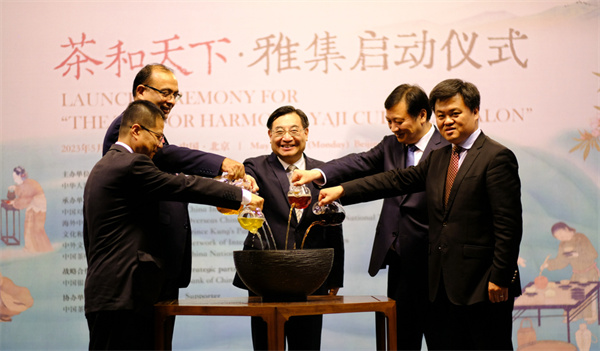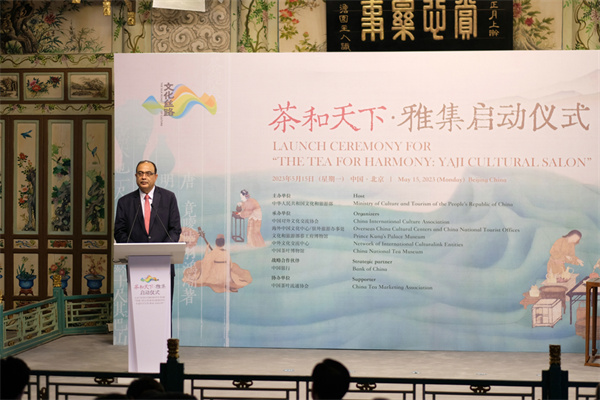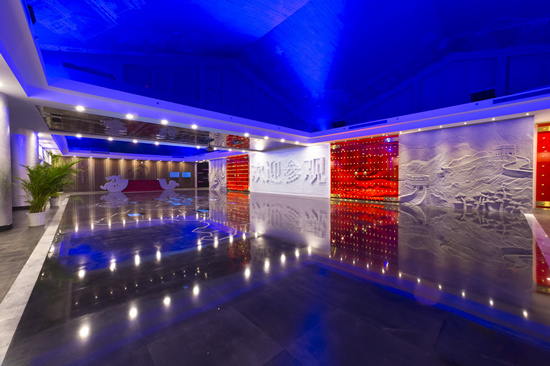Global event launched in Beijing to promote Chinese tea culture

Hu Heping (center), minister of culture and tourism, launches the "Tea for Harmony: Yaji Cultural Salon" global event with four other guests by pouring tea water into a big bowl in Beijing on May 15, 2023. [Photo by Yang Xiaoyu/chinadaily.com.cn]
"Tea for Harmony: Yaji Cultural Salon", a global event to promote China's tea culture hosted by the Ministry of Culture and Tourism, was launched on Monday at the Prince Kung's Palace Museum in Beijing.
Hu Heping, minister of culture and tourism; Shahbaz Khan, UNESCO's representative to China; and Hu Wei, deputy governor of Zhejiang province attended the event along with about 200 guests, including more than 70 diplomats from some 40 countries and regions.
The event intends to "give tea a greater role in enhancing friendly dialogue and mutual learning between civilizations" and raise awareness of Chinese tea culture around the world, following the inscription of traditional tea processing techniques and their associated social practices in China on UNESCO's Representative List of Intangible Cultural Heritage of Humanity in 2022.
Also part of the International Tea Day celebrations, which falls on May 21, the yaji cultural salons themed on Tea for Harmony, will be held in 41 countries around the world by international organizations, Chinese embassies and consulates, China cultural centers, and tourism offices, according to the event host.
At the Yaji cultural salon, participants will be given an immersive opportunity to learn about Chinese tea culture through pictures, videos, intangible cultural heritage showcases and folk art performances.
Yaji, literally "gathering of elegance", was a common way for ancient Chinese literati to enjoy a collective cultural life. During the meeting, participants would recite poetry and appreciate tea, paintings, flowers, incense and guqin (traditional Chinese zither) music in pursuit of elegance, artistic sensibility and moral nobility.
A yaji was featured at the launch ceremony, where guests sampled various types of tea from different regions of China, Sri Lanka, Turkey and Zimbabwe, watched the performance of intangible cultural heritage chabaixi(painting on the ground tea leaves with plain water), and enjoyed the smell of incense and the music of guqin and the bamboo flute xiao.

Shahbaz Khan, UNESCO's representative to China, speaks at the launch of the "Tea for Harmony: Yaji Cultural Salon" global event. [Photo by Yang Xiaoyu/chinadaily.com.cn]
Khan said in his speech that 2023 marks the 20th anniversary of the adoption of the Convention for the Safeguarding of the Intangible Cultural Heritage. UNESCO will further conduct research and protect tea-related traditional skills and customs, carry out activities conducive to the sustainable production and consumption of tea, and raise people's awareness of the importance of tea in eradicating poverty, so as to protect the collective heritage of mankind and contribute to promoting dialogues among civilizations.
A representative of the 14 Chinese provinces and autonomous regions in applying for the UNESCO inscription of China's tea making, Hu Wei said at the event that Zhejiang province has been committed to vigorously promoting tea culture and exploring its value in contemporary times.
In the future, the East China province looks to strengthen the global research, protection and promotion of tea culture; build tea culture brands; and tell stories of Zhejiang teas by using an international language and digital technologies, he added.
China International Culture Association, a non-profit organization, signed a cooperation letter of intent with Zhejiang Huzhou municipal people's government and both parties jointly launched the Lu Yu Tea Culture Promotion Foundation.

 Responsibilities of the SOCAAC
Responsibilities of the SOCAAC Experiencing Beijing 2023
Experiencing Beijing 2023